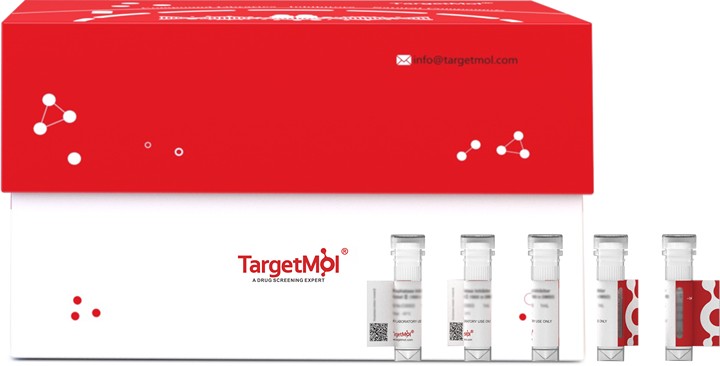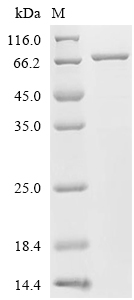Shopping Cart
Remove All Your shopping cart is currently empty
Your shopping cart is currently empty
Catalyzes the synthesis of acetyl-CoA from short-chain fatty acids. Acetate is the preferred substrate. Can also utilize propionate with a much lower affinity. Provides acetyl-CoA that is utilized mainly for oxidation under ketogenic conditions. Involved in thermogenesis under ketogenic conditions, using acetate as a vital fuel when carbohydrate availability is insufficient. ACSS1 Protein, Human, Recombinant (His) is expressed in yeast with N-10xHis tag. The predicted molecular weight is 73.6 kDa and the accession number is Q9NUB1.

| Pack Size | Price | USA Warehouse | Global Warehouse | Quantity |
|---|---|---|---|---|
| 5 μg | $105 | 20 days | 20 days | |
| 10 μg | $169 | 20 days | 20 days | |
| 20 μg | $283 | - | In Stock | |
| 50 μg | $428 | 20 days | 20 days | |
| 100 μg | $589 | 20 days | 20 days | |
| 200 μg | $892 | 20 days | 20 days | |
| 500 μg | $1,620 | 20 days | 20 days | |
| 1 mg | $2,530 | 20 days | 20 days |
| Biological Activity | Activity has not been tested. It is theoretically active, but we cannot guarantee it. If you require protein activity, we recommend choosing the eukaryotic expression version first. |
| Description | Catalyzes the synthesis of acetyl-CoA from short-chain fatty acids. Acetate is the preferred substrate. Can also utilize propionate with a much lower affinity. Provides acetyl-CoA that is utilized mainly for oxidation under ketogenic conditions. Involved in thermogenesis under ketogenic conditions, using acetate as a vital fuel when carbohydrate availability is insufficient. ACSS1 Protein, Human, Recombinant (His) is expressed in yeast with N-10xHis tag. The predicted molecular weight is 73.6 kDa and the accession number is Q9NUB1. |
| Species | Human |
| Expression System | P. pastoris (Yeast) |
| Tag | N-10xHis |
| Accession Number | Q9NUB1 |
| Synonyms | Propionate--CoA ligase,mitochondrial,KIAA1846,Acyl-CoA synthetase short-chain family member 1,ACSS1,Acetyl-coenzyme A synthetase 2-like, mitochondrial,Acetyl-CoA synthetase 2 (AceCS2),Acetate--CoA ligase 2,ACAS2L |
| Amino Acid | ASGPSGSAPAVAAAAAQPGSYPALSAQAAREPAAFWGPLARDTLVWDTPYHTVWDCDFSTGKIGWFLGGQLNVSVNCLDQHVRKSPESVALIWERDEPGTEVRITYRELLETTCRLANTLKRHGVHRGDRVAIYMPVSPLAVAAMLACARIGAVHTVIFAGFSAESLAGRINDAKCKVVITFNQGLRGGRVVELKKIVDEAVKHCPTVQHVLVAHRTDNKVHMGDLDVPLEQEMAKEDPVCAPESMGSEDMLFMLYTSGSTGMPKGIVHTQAGYLLYAALTHKLVFDHQPGDIFGCVADIGWITGHSYVVYGPLCNGATSVLFESTPVYPNAGRYWETVERLKINQFYGAPTAVRLLLKYGDAWVKKYDRSSLRTLGSVGEPINCEAWEWLHRVVGDSRCTLVDTWWQTETGGICIAPRPSEEGAEILPAMAMRPFFGIVPVLMDEKGSVVEGSNVSGALCISQAWPGMARTIYGDHQRFVDAYFKAYPGYYFTGDGAYRTEGGYYQITGRMDDVINISGHRLGTAEIEDAIADHPAVPESAVIGYPHDIKGEAAFAFIVVKDSAGDSDVVVQELKSMVATKIAKYAVPDEILVVKRLPKTRSGKVMRRLLRKIITSEAQELGDTTTLEDPSIIAEILSVYQKCKDKQAAAK |
| Construction | 38-689 aa |
| Protein Purity | > 90% as determined by SDS-PAGE.  |
| Molecular Weight | 73.6 kDa (predicted) |
| Endotoxin | < 1.0 EU/μg of the protein as determined by the LAL method. |
| Formulation | Tris-based buffer, 50% glycerol |
| Reconstitution | A Certificate of Analysis (CoA) containing reconstitution instructions is included with the products. Please refer to the CoA for detailed information. |
| Stability & Storage | Lyophilized powders can be stably stored for over 12 months, while liquid products can be stored for 6-12 months at -80°C. For reconstituted protein solutions, the solution can be stored at -20°C to -80°C for at least 3 months. Please avoid multiple freeze-thaw cycles and store products in aliquots. |
| Shipping | In general, Lyophilized powders are shipping with blue ice. Solutions are shipping with dry ice. |
| Research Background | Catalyzes the synthesis of acetyl-CoA from short-chain fatty acids. Acetate is the preferred substrate. Can also utilize propionate with a much lower affinity. Provides acetyl-CoA that is utilized mainly for oxidation under ketogenic conditions. Involved in thermogenesis under ketogenic conditions, using acetate as a vital fuel when carbohydrate availability is insufficient. |
| Size | Quantity | Unit Price | Amount | Operation |
|---|

Copyright © 2015-2026 TargetMol Chemicals Inc. All Rights Reserved.